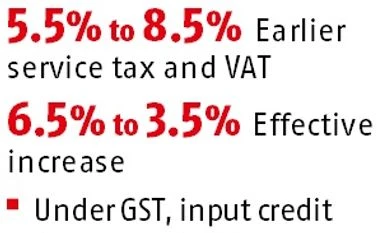Sales of luxury apartments in prime locations, basically those with land cost higher than construction cost, have been hit with rates further rising under the goods and services tax (GST) regime.
Sales of such apartments had already been hit due to weak demand.
“Developers cannot absorb the increased tax as the markets are down,” says Vijay Wadhwa, chairman at Mumbai-based Wadhwa Group.
“The 12 per cent GST is quite heavy,” he says.
Before the GST, home buyers were paying the service tax at 4.5 per cent in addition to the value-added tax (VAT) at varied rates (1-4 per cent). Under the GST regime, the construction sector has been put under the 18 per cent slab, though it is applicable only on two-thirds of the sell price now. That makes the effective rate about 12 per cent of the sell price.
So this way there has been an increase in the tax rate of 3.5-6.5 percentage points. But, under GST, there is input credit for raw materials used. This will supposedly offset this increase in the rate.
Input credit is provided only on construction cost, and that is as low as 30 per cent in prime location projects, say some developers. So for projects where the land cost is high, there is an effective increase in the tax rate.
Amit Bhagat, chief executive at ASK Property Investment Advisors, says: “In the case of luxury properties exceeding Rs 7,000 a square foot, there is an additional burden of 1-3 per cent in cost. If developers absorb it, it’s fine; otherwise, there will be an impact on sales,” he says.
Amit Agarwal, an analyst at Nirmal Bang Securities, says, “In cities like Mumbai, the land cost is as high as 50-60 per cent. In such a case apartment costs have gone up by 4-5 per cent as the input cost is not sufficient to offset the tax increase from the earlier 5.5 per cent (service tax and VAT) to 12 per cent under the GST,” he says.
Premium developers such as Oberoi Realty have decided to absorb this effective increase in tax. But many others are trying to pass it on to buyers, which has hit sales.
Niranjan Hiranandani, managing director at Hiranandani Communities, one of the largest developers of premium homes, says sales have been hit.
“There is some softness in sales of under-construction properties due to GST and Rera (Real Estate Regulatory Act) but ready flats are selling well,” said Hiranandani.
The GST is not applicable on completed projects hence they are not impacted.
Due to demonetisation and Rera, the launch of new housing projects has been hit in Ahmedabad, Bengaluru, Chennai, Hyderabad, Kolkata, Mumbai, the National Capital Region, and Pune. It came down by 41 per cent in the first half of 2017, a seven-year low, according to a report by Knight Frank.
Sales fell by 11 per cent on a yearly basis, the lowest first-half sales in the past five years, it said.
“Demonetisation, Rera and GST came within six months. They are bound to have a short-term impact on sales,” said Shishir Baijal, chairman, Knight Frank India.
Unlock 30+ premium stories daily hand-picked by our editors, across devices on browser and app.
Pick your 5 favourite companies, get a daily email with all news updates on them.
Full access to our intuitive epaper - clip, save, share articles from any device; newspaper archives from 2006.
Preferential invites to Business Standard events.
Curated newsletters on markets, personal finance, policy & politics, start-ups, technology, and more.
)